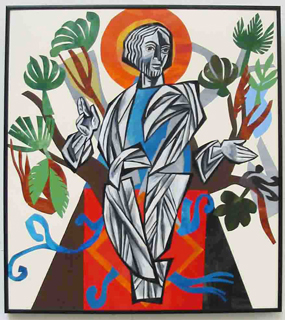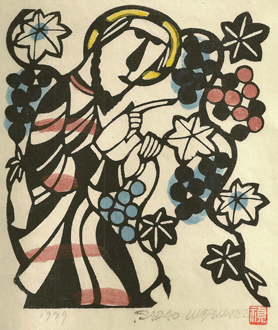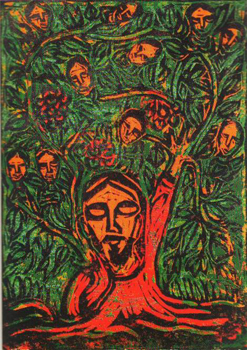For Sunday April 29, 2016
Lectionary Readings (Revised Common Lectionary, Year B)
Acts 8:26-40
Psalm 22:25-31
1 John 4:7-21
John 15:1-8
Once, when my daughter was two years old, her grandfather took her out for ice cream. After parking his car and lifting my daughter out of her toddler seat, my dad offered her his thumb. “You have to hold it tight until we’re inside the ice cream shop, okay?” he told her. “This is a busy street.” My daughter took one look at his outstretched hand, wrapped her left fist around her own right thumb, and said “No, thank you. I can hold my own.”
“No, thank you, I can hold my own," might be the perfect slogan for Western Christianity. We are products of a contemporary culture that celebrates the individual and distrusts the communal. We often represent the Christian life as a one-on-one transaction beween a single believer and her God: “I accepted Jesus as my Savior.” We put a lot of stock in our personal spiritual experiences: my prayer life, my worship, my epiphany.
If we do align ourselves with a larger Christian community, we generally do so with a consumer mindset, trusting that we’re free to join up and free to quit as personal preference dictates. We are, in other words, proud Lone Rangers. We believe in pulling ourselves up by our own bootstraps, and encouraging others to do the same. We struggle not to view dependence as moral weakness. We cherish our personal space, and feel claustrophic when other people press too close. We believe, of course, in loving our neighbors, but we feel most comfortable loving them from a distance, or at least with one eye trained on the nearest exit.
 |
Given this context, I can’t imagine a more counter-cultural and challenging vision of the Christian life than the one Jesus offers us in this week’s lectionary reading: “I am the vine, and you are the branches,” he tells his disciples. “Those who abide in me and I in them bear much fruit, because apart from me, you can do nothing.” If those words aren’t blunt enough, he continues: “Whoever does not abide in me is thrown away like a branch and withers; such branches are gathered, thrown into the fire, and burned.”
Burned? Gulp. Goodbye, Lone Ranger. Hello… branches??
I’m not much of a gardener, but I have a potted jasmine vine growing on my patio. It’s fragrant and beautiful, but here’s the thing: it doesn’t care one whit about personal space. It’s a messy, curly, jumbly thing. It stretches, it spreads, and it invades. It grows in all kinds of tangled up directions, and its densely interwoven tendrils are just about indistinguishable from each other.
If this is Jesus’s metaphor for the spiritual life, then I think Lutheran pastor Nadia Bolz Weber says it best: Christianity is a lousy religion for the “I’ll do it myself” set. We are meant to be tangled up together. We are meant to live lives of profound interdependence, growing into, around, and out of each other. We cause pain and loss when we hold ourselves apart, because the fate of each individual branch affects the vine as a whole. In this metaphor, dependence is not a matter of personal morality or preference; it’s a matter of life and death — branches that refuse to cling to the vine die.
My problem, of course, is that I don’t believe this. I don’t want to believe it, because it’s inconvenient and offensive. It implies that my life is not my own. That my choices affect people I don’t even know. That I am bound to the community of God’s people whether such boundedness suits my temperament or not. Worse, it requires me to hold two seemingly contradictory truths in perpetual tension. One: that the point of my Christian life isn’t me — my growth, my catharsis, my contributions, my achievements. I am inextricably connected to a larger whole, and apart from that whole, my spirituality — profound and precious though it might feel to me — is without value. Apart from the vine, I am not only barren; I am dead. In other words, I’m not the fruit in this metaphor. I’m not supposed to be the end product of my own spiritual life.
 |
And two: that I matter more than I can possibly imagine — that every branch matters more than I can possibly imagine — because the fruitfulness of God’s vine is no trivial thing — it constitutes the life and nourishment of the world. I read a little bit about grapevines this week. Apparently, the best grapes are produced closest to the central vine, where the nutrients are the most concentrated. To cut myself off from the vine, then, is to diminish my fruitfulness. It is to deny the world the fruit of Christ’s saving, cleansing, healing love.
I titled this essay, “Abide,” because it’s the key word in Jesus’s metaphor, appearing eight times in the lection. If God is the vinegrower, Jesus is the vine, and we are the branches, what should we do? We have only one task: to abide. To tarry, to stay, to cling, to remain, to depend, to rely, to last, to persevere, to commit, to continue, to tolerate, to endure, to acquiesce, to accept. To hang in there for the long haul. To make ourselves at home.
It’s a tricky word. Passive on the one hand, and active on the other. To abide is to stay rooted in place. But it is also to grow, to change, and to multiply. It’s a vulnerable-making verb: if we abide, we’ll get pruned. It’s a risky verb: if we abide, we’ll bear fruit that others will see and taste. It’s a humbling verb: if we abide, we’ll have to accept nourishment that is not of our own making. And it’s a relentlessly communal verb — if we abide, we will have to coexist with our fellow branches. We will have to live a life that is messy, crowded, tangled, and gorgeous. A life that’s deeply rooted and wildly fertile.
I can’t imagine that there was ever a time when Jesus’s followers found the metaphor of the vine easy to apply in daily life. But I also think that it’s especially challenging to do so now. We live in bitterly divided times. We have good reasons to be cautious and self-protective, even within the Church. It’s hard in our self-promoting culture to confess that we are lost and lifeless on our own. That our glory lies in surrender, not self-sufficiency.
Equally hard is the spiritual and imaginative leap we must make in order to trust the metaphor at all. As in, really? Jesus really isn't just a wise teacher? A good role model? A provocative historical figure? He's really the very source and sustainer of my life?
 |
My dad and I had a good laugh over my daughter’s attempt at independence when he brought her home from their outing. Needless to say, he didn’t allow his two-year-old granddaughter to hold her own hand while crossing the street. He told her she had to grasp his thumb, or else miss out on the ice cream. In typical toddler fashion, my daughter threw a tantrum, waited for a few minutes to see if my dad would relent (he didn’t), and finally grabbed hold of his hand, not letting it go until she got her ice cream.
If only we would surrender our ferocious independence with no more than a quick tantrum. If only we would consent to see reality as it truly is: not that Jesus is sitting around waiting for us to get organized, but that he has already started nourishing the world through us. “I AM the vine,” he told his disciples. “You ARE the branches.” It’s a done deal. Meaning that whether we like it or not, our lives are bound up in his and in each other’s. Meaning that the only true life we will live in this world is the life we consent to live in relationship, messy and entangled though it might be. Meaning that the only fruit worth sharing with the world is the fruit we produce together.
Yes, it’s difficult. But it’s also easy. Remember: our Vine is true and our Vinegrower is skilled. This is what we were made for. Abide.
Image credits: (1) The Writers' Block, All Saints' Center for Theology; (2) The Daily Office; and (3) Artway.





